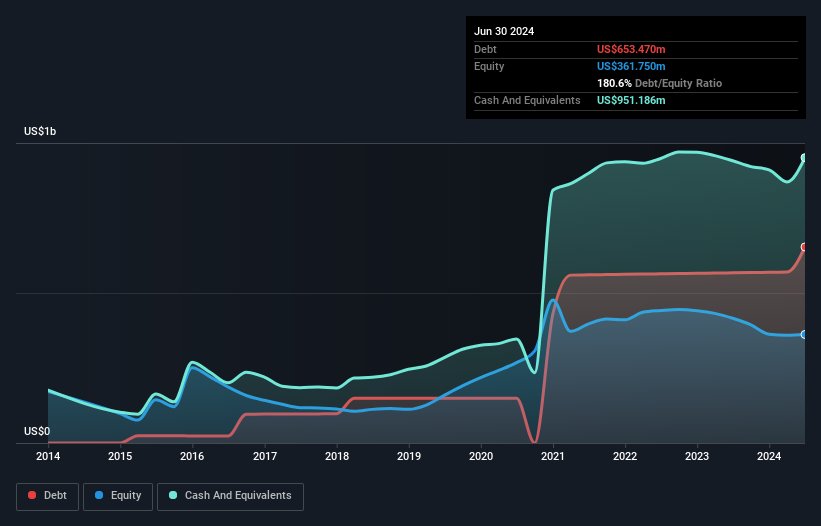
Howard Marks put it nicely when he said that, rather than worrying about share price volatility, 'The possibility of permanent loss is the risk I worry about... and every practical investor I know worries about.' It's only natural to consider a company's balance sheet when you examine how risky it is, since debt is often involved when a business collapses. Importantly, NovoCure Limited (NASDAQ:NVCR) does carry debt. But is this debt a concern to shareholders?
When Is Debt Dangerous?
Debt and other liabilities become risky for a business when it cannot easily fulfill those obligations, either with free cash flow or by raising capital at an attractive price. In the worst case scenario, a company can go bankrupt if it cannot pay its creditors. However, a more common (but still painful) scenario is that it has to raise new equity capital at a low price, thus permanently diluting shareholders. Having said that, the most common situation is where a company manages its debt reasonably well - and to its own advantage. When we examine debt levels, we first consider both cash and debt levels, together.
Check out our latest analysis for NovoCure
How Much Debt Does NovoCure Carry?
The image below, which you can click on for greater detail, shows that at June 2024 NovoCure had debt of US$653.5m, up from US$567.2m in one year. But it also has US$951.2m in cash to offset that, meaning it has US$297.7m net cash.

How Strong Is NovoCure's Balance Sheet?
According to the last reported balance sheet, NovoCure had liabilities of US$169.2m due within 12 months, and liabilities of US$681.2m due beyond 12 months. Offsetting these obligations, it had cash of US$951.2m as well as receivables valued at US$97.6m due within 12 months. So it actually has US$198.3m more liquid assets than total liabilities.
This surplus suggests that NovoCure has a conservative balance sheet, and could probably eliminate its debt without much difficulty. Succinctly put, NovoCure boasts net cash, so it's fair to say it does not have a heavy debt load! There's no doubt that we learn most about debt from the balance sheet. But ultimately the future profitability of the business will decide if NovoCure can strengthen its balance sheet over time. So if you want to see what the professionals think, you might find this free report on analyst profit forecasts to be interesting.
Over 12 months, NovoCure reported revenue of US$550m, which is a gain of 8.3%, although it did not report any earnings before interest and tax. We usually like to see faster growth from unprofitable companies, but each to their own.
So How Risky Is NovoCure?
Statistically speaking companies that lose money are riskier than those that make money. And we do note that NovoCure had an earnings before interest and tax (EBIT) loss, over the last year. And over the same period it saw negative free cash outflow of US$104m and booked a US$169m accounting loss. But the saving grace is the US$297.7m on the balance sheet. That means it could keep spending at its current rate for more than two years. Overall, its balance sheet doesn't seem overly risky, at the moment, but we're always cautious until we see the positive free cash flow. The balance sheet is clearly the area to focus on when you are analysing debt. But ultimately, every company can contain risks that exist outside of the balance sheet. For example - NovoCure has 2 warning signs we think you should be aware of.
When all is said and done, sometimes its easier to focus on companies that don't even need debt. Readers can access a list of growth stocks with zero net debt 100% free, right now.
Valuation is complex, but we're here to simplify it.
Discover if NovoCure might be undervalued or overvalued with our detailed analysis, featuring fair value estimates, potential risks, dividends, insider trades, and its financial condition.
Access Free AnalysisHave feedback on this article? Concerned about the content? Get in touch with us directly. Alternatively, email editorial-team (at) simplywallst.com.
This article by Simply Wall St is general in nature. We provide commentary based on historical data and analyst forecasts only using an unbiased methodology and our articles are not intended to be financial advice. It does not constitute a recommendation to buy or sell any stock, and does not take account of your objectives, or your financial situation. We aim to bring you long-term focused analysis driven by fundamental data. Note that our analysis may not factor in the latest price-sensitive company announcements or qualitative material. Simply Wall St has no position in any stocks mentioned.
About NasdaqGS:NVCR
NovoCure
An oncology company, engages in the development, manufacture, and commercialization of tumor treating fields (TTFields) devices for the treatment of solid tumor cancers in the United States, Germany, France, Japan, Greater China, and internationally.
Good value with adequate balance sheet.

